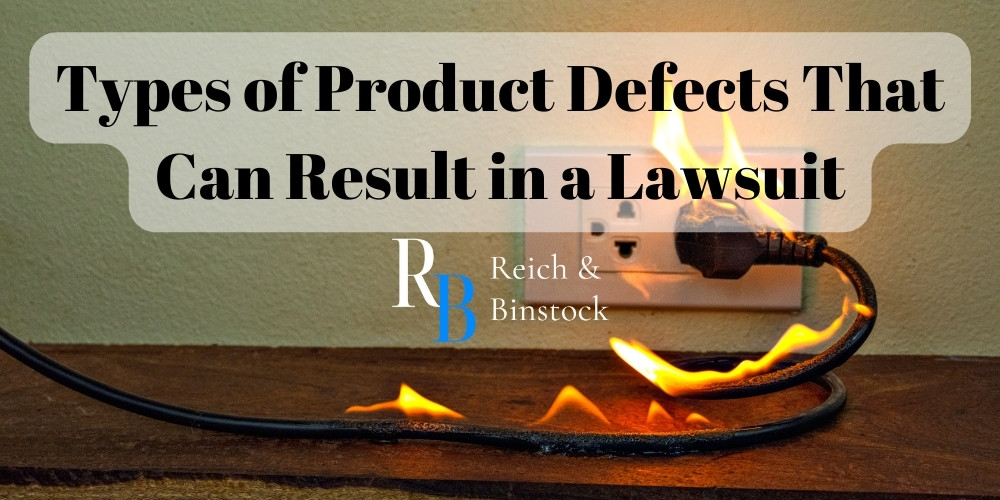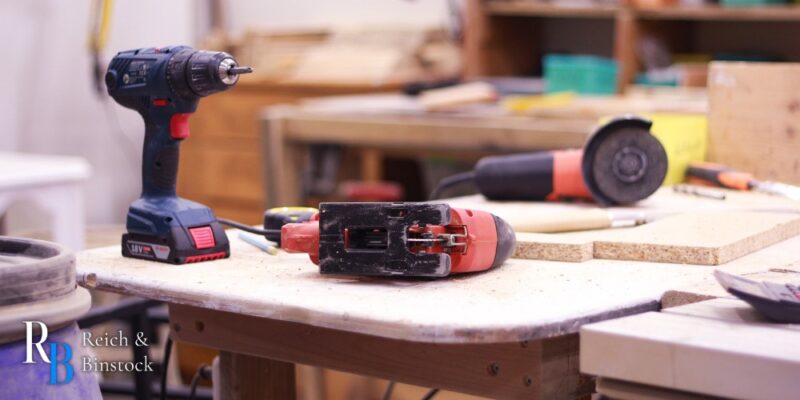Did you know that if you purchased a defective product, you may have the grounds for a lawsuit? All parties in the chain of distribution, whether it be the designer, manufacturer, distributor, or seller, have the legal responsibility to ensure their product is safe for consumer use. Once that product enters the marketplace, consumers should be able to assume that the product is both effective and harmless. If it turns out, however, that the product is actually defective and harmful, the consumer may hold the responsible party legally responsible. While there are a number of ways a product might prove harmful, there are generally three types of product defects that can result in a lawsuit.
The Houston product liability attorneys at Reich & Binstock have considerable experience taking on product liability cases involving a wide range of industries and types of defects. If you or someone you know was harmed by a product defect, you may be entitled to financial compensation. To schedule a free consultation about your case, please call our office at 713-622-7271 today.
What Makes a Product Defective?
When we talk about a product defect, it’s important to understand what that could mean. What exactly turns a normal, functioning product into a defective one? More importantly, when could a consumer who purchased a defective product file a claim? Every case is unique, but the following examples constitute defective products.
- Product is not fit for the intended purpose. Think of a life jacket that doesn’t float when someone wears it in the water. This makes it unfit for the originally intended purpose.
- Product has inadequate warning labels outlining potential risks. Imagine a toy store selling a toy that comes with small parts. If that product doesn’t have warning labels about possible choking hazards, its lack of proper labels makes it defective.
- Product does not come with accurate instructions. If you buy a children’s outdoor swing set, this set should come with clear instructions. If the instructions for assembly are incorrect, the swing set could fall apart during use and cause injuries.
- Product is innately dangerous because of a flaw or defect. For example, imagine an airbag that inflates improperly and could cause injuries during a car accident. This is an innately dangerous and, therefore, defective product.
What Is Considered a Defective Product?
Before we get into the types of product defects that can result in a lawsuit, it’s important to understand defective products in and of themselves. A defective product arises when someone uses it for its intended purpose, yet it presents an unreasonable risk of danger or harm. Some more common examples of defective products may include any of the following:
- Auto parts and design defects
- Pharmaceutical drugs
- IVC filters
- Medical devices
- Power tools
- Construction equipment
- Home appliances
- Household products
- Windows
- Drywall
- Children’s toys
- Sporting goods and recreational equipment
- Gardening tools
Who Is Responsible for a Defective Product?
Product designers, manufacturers, distributors, marketers, and sales operations have clear responsibilities and safety standards to adhere to when producing safe products. One of these is properly warning consumers of any and all potential dangers relating to the product.
To prevent defective and dangerous products from reaching consumer markets, vendors of all kinds must provide proper safety warnings. Additionally, it is the responsibility of these parties to recall defective products in cooperation with federal guidelines as necessary. That is to say, if they are not aware of the defect when producing it but are made aware of it after the fact, they should notify the public and take their product off the market immediately.
The three parties most often held liable for defective products are manufacturers, sellers, or owners of those products. If a flaw in design or manufacturing defect occurs, the manufacturer could be held liable for damages.
In some cases, whoever sold the dangerous product could also be responsible for any damages associated with the product. This is because they knew or should have known about the defect.
Lastly, even owners of products could face legal consequences. Certain products, like power tools, appliances, and others, are inherently more dangerous than others. However, when these products are used properly, no injuries should occur. If a product owner’s improper use of that product causes injuries, they can be held liable in court.
What Is Strict Liability in Product Liability Law?
Strict product liability is a legal doctrine that allows victims who are injured by unreasonably dangerous products to file claims for compensation without having to prove intentional misconduct or negligence. In many personal injury or tort cases, plaintiffs must prove negligence or intentional misconduct to recover damages. This is not required in product liability cases.
When Is a Company Strictly Liable for Defects in Its Product?
Manufacturers of products are more likely to be liable for products that feature a manufacturing or design defect. This means that the product was unsafe at its earliest stages, before even leaving the box. The lack of a proper warning label on the product could also be something that holds the manufacturers accountable.
Retailers of defective property may also hold blame when it comes to defective products. If a seller knowingly sold you a damaged or harmful product without telling you, they would be liable. As an ordinary consumer, it isn’t your responsibility to anticipate a foreseeable risk with a product. Rather, it is the responsibility of the manufacturers, sellers, and owners of products to identify manufacturing defects, design defects, and labeling defects, then take appropriate action.
Types of Product Defects
Product defects may arise due to poor manufacturing, faulty design, or careless packaging and instructions. It can also occur when a company fails to warn of a product’s potential risks or hazards. There are endless possibilities when it comes to products that are defective. However, these can be categorized into three main types: design, manufacturing, and marketing defects. Below, we will break down each of the three types of product defects that can result in a lawsuit.
Design Defects
Some products are inherently flawed from the very beginning of the product’s lifespan. Whether poorly thought out or improperly tested, the product simply missed the mark. If a product causes a preventable injury to a consumer and proves to be unsafe for its intended use, this is what we call a design defect.
Sometimes, when companies find out that a design defect occurs with their product, they will recall it and provide a reasonable alternative design. If the original design was inherently dangerous, it is the manufacturer’s job to rework it to make it safer.
A product with a defective design likely means that all those still being sold are also defective or harmful. In this case, you can file a design defect claim against the company that manufactured the product and seek compensation for your losses.
Design Defect Examples
Defects in design are inherent to a product, as they exist before the manufacturing process ever occurs. Even if the product functions as intended, a design flaw could still pose foreseeable consumer risks. Generally, these claims are brought against the company that designed the product rather than a manufacturer, seller, or owner. Some examples of design defects include the following.
- Articles of clothing that are excessively flammable or parts of appliances that melt or suffer damage on high settings
- Poorly designed safety guards that don’t help to prevent injuries
- Products that are structurally unsound, like bunk beds or bookshelves
- Toys with unusual hazards, such as choking hazards
- Products that fail to properly contain and store toxic substances
Although some companies can evade liability with warning labels, this is not always the case. When someone files a defective design claim, they must be able to show that the design defect caused the injury rather than improper use of the product. If they can do this, the company responsible for the design is unlikely to be able to circumvent culpability.
Manufacturing Defects
If it’s proven that the original design of the product is not what caused the injury, your attorney will look into the product’s manufacturing. This means that rather than the initial, intended design of the product, they will look further into the actual construction of the product. If an error were made during the stage of its assembly or production, it would be a manufacturing defect.
Because manufacturers are responsible for ensuring their products are safe, they can be held liable for manufacturing defects that cause injury. It is not necessary that they know about the manufacturing defect for a plaintiff to have a successful product liability claim.
Manufacturing Defect Examples
In most cases, manufacturing defects only affect a small number of products. However, certain types of manufacturing defects are more common than others. Some examples of these defects include the following.
- Missing pieces or incomplete assembly
- Incorrect assembly or improper installation
- Incorrectly calibrated or programmed
- Problems with low-quality raw materials
- Poorly manufactured parts or pieces
More specific examples include contaminated food products, failure of specific parts in a product, medications that are contaminated, or mechanical defects in cars that cause accidents.
Marketing Defects
A marketing defect is what one might consider the last stage of product defects. In this case, it may not even be the product itself that is harmful or misleading, but rather the package or instructions it came with. It could also be the way in which the company advertised the product that gave a misleading impression of the product.
Any known warnings or risks associated with the intended use of the product should be perfectly clear and evident to consumers. Failure to warn consumers of foreseeable risks could lead to injuries and the company being held liable for those injuries.
Marketing Defect Examples
Any form of marketing that fails to prioritize consumer safety can be considered a marketing defect. Examples of marketing defects include the following.
- False claims about a product
- Failing to warn consumers about product risks
- Incorrect or incomplete instructions for a product
- Inadequate warning labels
- Advertisements that encourage consumers to use a product improperly
What Are Your Rights in a Product Liability Case?
As a consumer, you have the right to expect that the products you buy won’t cause you any injuries. If you do suffer an accident or injury from a defective product, the doctrine of strict liability gives you the right to pursue compensation for those injuries. It is not necessary to prove negligence to have a successful product liability lawsuit.
The following damages may act as compensation for a plaintiff’s injuries in a product liability case.
- Medical bills
- Pain and suffering
- Lost wages
- Loss of earning capacity
- Emotional distress
- Property damage
- Wrongful death
Contact the Houston Product Liability Lawyers at Reich & Binstock Today
Product manufacturers and related parties who may be responsible for defects are sure to hire a strong defense with skilled, resourceful legal teams. Their job is to limit the company’s liability and minimize any compensation you, as the consumer, may receive in a legal settlement or verdict. Meanwhile, at Reich & Binstock, we do just the opposite. Our skilled product liability attorneys work to prove the liability of the company and maximize the amount of compensation you deserve.
If you or a loved one received injuries due to a defective product, you need Houston’s best product liability lawyers on your side. Call us today at 713-622-7271 to schedule your free consultation with a skilled product liability attorney.

















